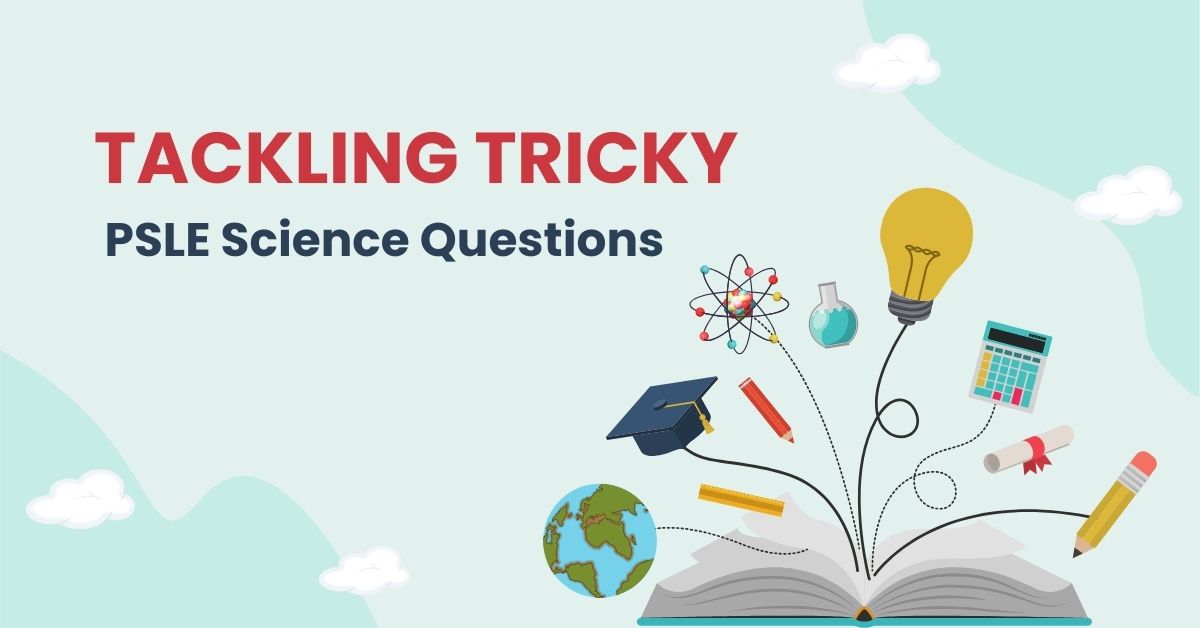The Primary School Leaving Examination (PSLE) Science paper in Singapore is renowned for its challenging questions that test students’ understanding beyond rote memorisation. The 2024 PSLE Science exam was no exception, featuring questions requiring critical thinking and applying scientific concepts. In this blog, we’ll delve into some of the trickiest questions from the 2024 PSLE Science paper and provide strategies to tackle such questions effectively.
The Complexity of PSLE Science Questions
PSLE Science questions often go beyond simple recall; they assess students’ ability to apply knowledge in unfamiliar contexts. For instance, questions may involve interpreting experimental setups, analysing data, or explaining phenomena in real-world scenarios. This approach ensures that students not only memorise facts but also understand the underlying principles and can apply them appropriately.
Walkthrough of 5 Tricky 2024 PSLE Science Questions
1. Understanding Light and Photosynthesis
An experiment was presented with three setups, each having different numbers of batteries and bulbs arranged in a series circuit, placed near water plants. The aim was to test how the amount of light affects the rate of photosynthesis, measured by the volume of oxygen produced.
Key Concepts:
Light Intensity and Photosynthesis: The more intense the light, the higher the rate of photosynthesis.
Series Circuit Behaviour: In a series circuit, adding more batteries increases the brightness of the bulbs, thereby improving light intensity.
Strategy: Students needed to analyse the setups, identify the variable being changed (number of batteries and bulbs), and understand its effect on light intensity and subsequently on the rate of photosynthesis.
2. Interpreting Temperature Graphs
A graph depicting the temperature changes of a substance over time was provided. Students were required to interpret the graph to determine the phase changes occurring at specific points.
Key Concepts:
Phase Changes: Understanding the temperature at which a substance changes from solid to liquid (melting point) and liquid to gas (boiling point).
Graph Interpretation: Identifying the flat regions on the graph indicating phase changes where temperature remains constant.
Strategy: Students should familiarise themselves with typical temperature-time graphs for phase changes and practice interpreting them to identify key points.
3. Direction of Forces
A scenario involving a moving object was presented, and students were asked to determine the direction of the force acting on the object.
Key Concepts:
Newton’s Laws of Motion: An object will move toward the net force acting upon it.
Force and Motion: Understanding how different forces (e.g., friction, gravity) affect the motion of objects.
Strategy: Students should analyse the given scenario, identify all forces acting on the object, and determine the resultant force to ascertain the direction of motion.
4. Analysing Life Cycles and Environmental Impact
A question presented a diagram of an organism’s life cycle and asked students to analyse how environmental changes could affect the organism’s survival.
Key Concepts:
Life Cycles: Understanding the stages of an organism’s life cycle and the conditions required for each stage.
Environmental Factors: Recognising how ecological changes (e.g., temperature, habitat destruction) can impact an organism’s survival.
Strategy: Students should study various life cycles and their influencing factors, and practice applying this knowledge to hypothetical scenarios.
5. Electromagnetism and Motion
A setup involving a magnetic field and a moving conductor was provided, and students were required to explain the motion observed.
Key Concepts:
Electromagnetic Induction: Understanding how a moving conductor in a magnetic field induces an electric current.
Force on a Current-Carrying Conductor: Recognising the direction of force acting on a conductor carrying current in a magnetic field.
Strategy: Students should familiarise themselves with the principles of electromagnetism and practice applying them to different setups.
Tips to Tackle Challenging PSLE Science Questions
Understand the Question Thoroughly: Read each question carefully to grasp what is being asked. Pay attention to keywords and any diagrams provided.
Apply Scientific Concepts: Relate the question to the scientific concepts you have learned. Think about how these concepts apply to the given scenario.
Use Clear and Precise Language: When explaining your answers, use accurate scientific terminology. Avoid vague statements and be specific in your explanations.
Practice Regularly: Regular practice with past PSLE Science papers can help familiarize you with the types of questions asked and improve your problem-solving skills.
Seek Clarification When Needed: If you’re unsure about a concept, seek help from teachers or tutors. Understanding the underlying principles is crucial for tackling complex questions.
Recommended Resources for PSLE Science Preparation
To further enhance your PSLE Science preparation, consider the following resources:
PSLE Science Practice Papers: Regular practice with past papers can help familiarise you with the exam format and types of questions asked.
PSLE Science Revision Guides: Comprehensive guides that cover all topics in the PSLE Science syllabus, providing explanations and practice questions.
PSLE Science Tuition Centres: Enrolling in a reputable PSLE Science tuition centre can provide personalised guidance and support in areas where you need improvement.
Final Words
The 2024 PSLE Science paper presented questions that challenged students to apply their knowledge and think critically. By understanding the underlying concepts and practising regularly, students can develop the skills to tackle such questions effectively. Remember, consistent effort and a clear understanding of scientific principles are key to success in PSLE Science.


